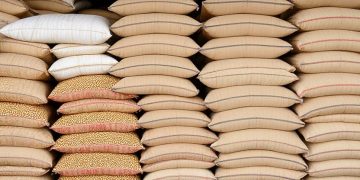The U.S. agriculture industry is reporting financial strain as recent tariff policies contribute to shifting trade dynamics, particularly with China, one of the country’s largest export markets for agricultural products.
Exporters and trade groups cite rising cancellations of export orders and logistical disruptions, pointing to economic impacts already being felt across various segments of the sector. According to the Agriculture Transportation Coalition (AgTC), U.S. agricultural exporters have begun experiencing significant order cancellations and delayed shipments as retaliatory tariffs from key trading partners, especially China, take effect.
Recent data from the U.S. Department of Agriculture indicates that China has cancelled 12,000 tons of pork orders, marking the largest such cancellation since 2020. Other impacted goods include lumber, hay, wood pulp, and paperboard, with reports of delayed shipments, increased warehousing costs, and the rerouting of cargo to alternative markets such as Japan, Taiwan, and Dubai.
The Port of Oakland, a major export hub for perishable and containerized agricultural products, has also raised concerns about potential impacts on local employment and trade flow. Executive Director Kristi McKenney noted that retaliatory tariffs could affect exports of key goods such as almonds, beef, dairy, and recycled materials. China is the port’s top import partner and third-largest export partner, accounting for 29% of its total trade volume.
A report from AgTC noted that exporters of containerized goods—such as refrigerated meats, produce, and processed foods—are particularly vulnerable. About 25% of U.S. agricultural exports by volume and 55% by value are containerized, making them subject to new port fees under the recently passed SHIPS Act. These fees, estimated at over $1.5 million for Chinese-built vessels calling at U.S. ports, are expected to take effect in the fall. While bulk agricultural shipments are exempt, containerized goods are currently not, prompting ongoing efforts to seek broader exemptions.
According to the Vizion Global Ocean Bookings Tracker, bookings for U.S. imports from China have also declined, down 22.15% week-over-week and 44% year-over-year as of mid-April. Stakeholders note that limited vessel space, rising freight rates, and logistical constraints have led some exporters to delay shipments and reduce workforce capacity.
Efforts to address the trade disruptions are ongoing. Agricultural groups are urging federal officials to consider additional policy adjustments, including fee exemptions for containerized agricultural exports, to stabilize trade flows and mitigate further economic impacts.
The Office of the U.S. Trade Representative has not issued a formal response regarding possible fee exemptions as of publication.
Get the latest supply chain logistics news updates at The Supply Chain Report. Visit ADAMftd.com for free tools related to international trade.
#USAgriculture #TradeImpacts #TariffPolicy #AgriculturalExports #GlobalTrade #FarmEconomy #TradePolicyShifts















